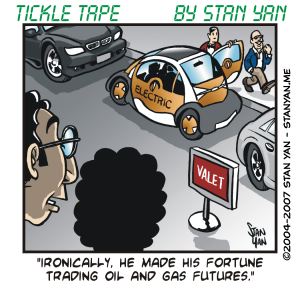Winning traders cultivate feelings of inner-worth. It doesn’t matter how poorly they do in the markets, they feel that their life has value; their mere existence in the world makes them feel fulfilled and valuable. For many people, however, this is easier said than done. Throughout our lives, we learn that our value as people depends on what we do, and often, how well we do it. Our parents may have implied that they would not fully love us unless we did what they wanted. Only when we were “good children” did our parents love us fully.
Our teachers may have often told us that if we didn’t follow the rules, we weren’t “good students” or “good citizens.” Eventually, we arrived at the conclusion that we were only as good as what we accomplished in life. Our job, the amount of money we make, the car we drive, the house we own, and the neighbourhood we live in are all indicators of “success.” We tend to believe that they are the ultimate measure of our worth and that if we were to “make it,” we would gain the respect of our friends and loved ones. Did you go to your high school reunion? Many people dread going because of the inevitable comparisons between our old friends and classmates.
You may want to see your own friends, but at the same time, you may also want to “show them” how well you’ve done. It’s natural to seek status and financial success. The more of it you have, the more secure you’ll be in society. There comes a point, however, where it is vital that you do not let a desire for status or wealth go too far. You do not want to let your accomplishments define your self-worth. And when it comes to trading, you don’t want to allow your profits to define your value as a trader or as a person.
Ironically, many winning traders wanted to succeed at an early age. Many traders say that as youngsters they were willing to do whatever it took to achieve success. The psychoanalyst Alfred Adler called this dynamic “striving for superiority.” As children, many successful people felt a sense of inadequacy and uncertainty. In order to compensate for this sense of inferiority, they decided to achieve a sense of mastery and superiority. The need for mastery can be a very powerful motivator, but at the same time, it can be a curse.
Since at the core of one’s drive for success is a need to overcome a sense of inferiority, a sense of inadequacy always lies at the back of one’s mind. Most of the time, it doesn’t matter, but at times when things are either going extremely well or extremely poorly, feelings of inferiority can creep out. When things are going well, one is bound to feel that something is amiss, and unconsciously one may secretly want to make a big mistake in order to put things right. When things are going especially poorly, one naturally feels a sense of inadequacy. It is useful to realize that even the person who seems to have a strong ego may secretly have feelings of inadequacy.
They may impact your success when you least expect it. Acknowledging these feelings and realizing that they may undermine your efforts can help you neutralize them. The best way to neutralize them is to not let your self worth be contingent on your accomplishments. It doesn’t matter what you do. It doesn’t matter how many profits you make. You are still a valuable person. It is also important to realize that trading is just one area of your life. You have other roles, such as parent, child, friend, spouse, or merely, member of society. These roles also give your life meaning. You can be rich in terms of self-worth even if you were flat broke.
It may seem ironic, but in the end, it is essential that you isolate your feeling of worth as a person from your performance as a trader. If you put your self-esteem on the line with your money, you’ll choke in the end. If you can separate your self-worth from your net worth, you’ll trade more profitably and consistently


